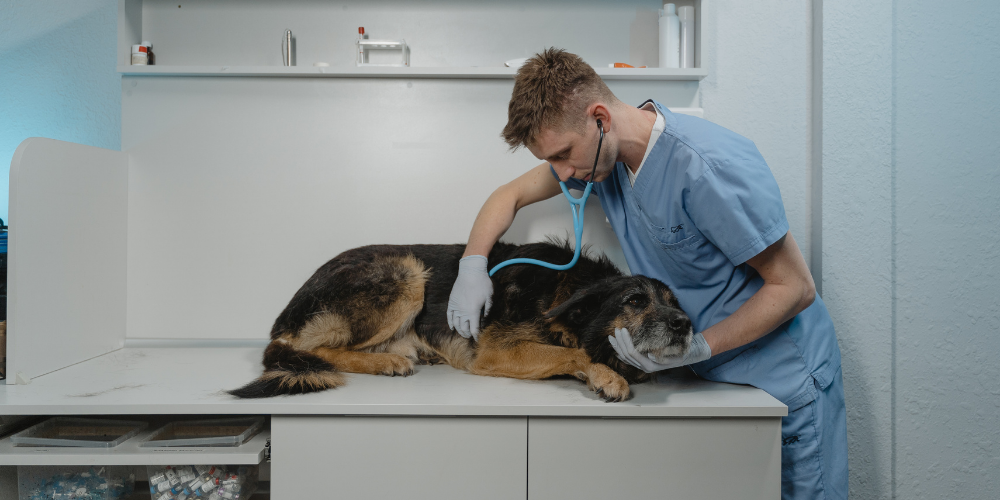Contents
Before you make the decision to become a vet there are a few things to take into consideration. While the idea of cuddling cute animals all day is certainly appealing, you’ll need a strong stomach for some of the work. If you’re still shouting “yes”, read this article to find out answers to common questions like “what GCSEs do you need to be a vet?”. 
What qualifications do I need to be a vet in the UK?
If you’re serious about mapping out your career as a vet it’s a good idea to work backwards. You’ll need to go to a university and complete a veterinary degree that’s approved by the Royal College of Veterinary Surgeons (RCVS).
The degrees are usually five years and you’ll also be expected to do Extra-Mural Studies (EMS) during semesters and your holidays too. These are practical placements and you can expect to put in a lot of weeks over the course of your degree. 🎓
What skills and personal qualities do I need to be a vet?
While you obviously need a qualification to work as a vet, let’s take a minute to consider whether it’s a career you’d be suited to and enjoy. The average salary for a veterinary surgeon/veterinarian is £30,000 when starting out to £50,000 when experienced, which are both above average. However, many people expect vets to make a lot more but vets usually go into the job because of the immense personal and professional reward they gain.
Here are some of the top skills and qualities you need as a vet:
- Be an animal person - you no doubt love animals or you wouldn’t be on this page but could you help all types of animals and not just kittens or puppies? Expect some strange situations to pop up and exotic animals (not all fun and friendly).
- Be a people person - you’ll need to communicate with animal owners (pet, farm, and otherwise) as well as people you work with. Having good verbal, listening, and writing skills will come in handy.
- Be a problem solver - those strange situations that pop up will require you to think quickly and out of the box. You may find yourself in some potentially dangerous scenarios too where you’ll need a level head.
None of these are meant to put you off by the way. There are obviously lots of perks to working as a vet but as with every job there will be easy tasks and hard ones, good days and bad ones, and as long as you’re prepared for every eventuality you’ll be fine. 👍
So, if you’re still raring to go and can’t wait to jump straight in, let’s find out what GCSEs do you need to be a vet and the next steps before uni.
What GCSEs do you need to be a vet in the UK?
While entry requirements vary between the universities there are some consistencies you can expect. Here are the minimum requirements to get into a vet course as found on the Government website:
|
Requirements |
Details |
|
5 GCSEs |
Grades 9 to 4 (A* to C) including Maths, English, and Science |
|
3 A Levels |
|
|
Volunteering |
You’ll need experience volunteering in a veterinary practice, and handling animals ranging from small domestic pets to larger livestock |
|
Uni specific entry screening |
You can expect to be interviewed by the uni and take screening tests at most too |
Do you need physics to be a vet?
Please note that many veterinary degrees require you to have physics so always be careful to check the specifications for any universities you’re interested in attending before choosing your GCSEs and A-Levels. If you end up needing physics and want some private lessons, we offer the first one for free for physics and any GCSE.
What GCSEs do I need to be a veterinary surgeon?
Whether you want to become a veterinary surgeon or a veterinary nurse, you’ll need five GCSEs including Maths, English, and Science. As it’s such a competitive field to get into, you’ll need excellent grades to get in. While the above table outlines A* to C, C is a minimum requirement but you should aim to get higher.
Getting ahead in your GCSEs is a lot of hard work but will be worth it if it means you get your dream job later on. If you find you’re struggling with any of your GCSEs, we have dedicated tutors who will give you one-to-one teaching and help boost your grades. This is one degree where you absolutely need to stand out at school. 💪
Well, now you have the answers to all the big questions like what skills you need and what subjects are needed to become a vet. All you need to do is pick your GCSEs, work hard, remember to have some downtime too, and enjoy your studies. Good luck with everything you do and we hope you get into the uni you want and land that dream job too.









